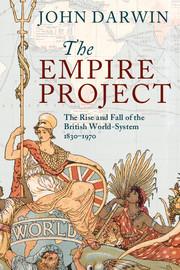Book contents
- Frontmatter
- Contents
- List of maps
- Preface and acknowledgments
- Introduction: the project of an Empire
- Part I Towards ‘The Sceptre of the World’: the elements of Empire in the long nineteenth century
- Part II ‘The great liner is sinking’: the British world-system in the age of war
- 8 The war for Empire, 1914–1919
- 9 Making imperial peace, 1919–1926
- 10 Holding the centre, 1927–1937
- 11 The strategic abyss, 1937–1942
- 12 The price of survival, 1943–1951
- 13 The third world power, 1951–1959
- 14 Reluctant retreat, 1959–1968
- Conclusion
- Notes
- Select bibliography
- Index
10 - Holding the centre, 1927–1937
Published online by Cambridge University Press: 11 December 2009
- Frontmatter
- Contents
- List of maps
- Preface and acknowledgments
- Introduction: the project of an Empire
- Part I Towards ‘The Sceptre of the World’: the elements of Empire in the long nineteenth century
- Part II ‘The great liner is sinking’: the British world-system in the age of war
- 8 The war for Empire, 1914–1919
- 9 Making imperial peace, 1919–1926
- 10 Holding the centre, 1927–1937
- 11 The strategic abyss, 1937–1942
- 12 The price of survival, 1943–1951
- 13 The third world power, 1951–1959
- 14 Reluctant retreat, 1959–1968
- Conclusion
- Notes
- Select bibliography
- Index
Summary
Until the mid-1920s, it had seemed as if the profound dislocation of economic and political life unleashed by the war would defeat all attempts to devise a new equilibrium. After 1925, the outlook improved. A new economic order took shape in Europe, underwritten by the flow of American investment. Franco-German reconciliation lifted the threat of a new European struggle. The impetus behind anti-colonial nationalism slackened off. The world economy recovered the vigour of its pre-war decade. The volume of trade surpassed the levels of 1913. As the age of extremes receded, liberalism and ‘moderation’ seemed in the ascendant. But it proved a false dawn. In October 1929, the Wall Street ‘crash’ signalled the return of economic uncertainty, followed soon after by the huge fall in commodity prices, the sharp contraction of trade, deep rural impoverishment and mass unemployment. The crisis of capitalism became the crisis of liberalism. The survival of nations and their internal stability demanded illiberal solutions: protection, autarky, or aggressive imperialism (to those with the means); a retreat to the land, exiguous self-sufficiency, or desperate rural rebellion to those without power. In culture, as in trade, free exchange was devalued in so hostile a climate. Utopianism, despair and nostalgia were its more typical products.
This massive upheaval in global conditions held huge implications for the British world-system. In the late 1920s, its liberal apologists had talked of a ‘third British Empire’, based not on rule but on the growth of cooperation and partnership in a world-spanning ‘Commonwealth’.
- Type
- Chapter
- Information
- The Empire ProjectThe Rise and Fall of the British World-System, 1830–1970, pp. 418 - 475Publisher: Cambridge University PressPrint publication year: 2009



